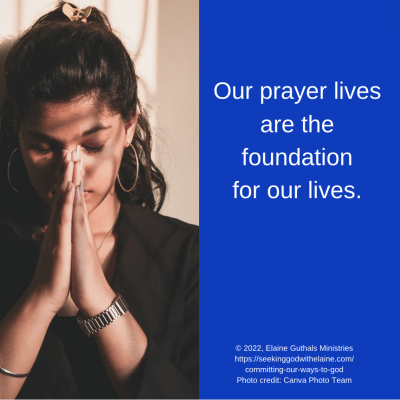In our quest for habitual holiness, we need to commit ourselves to God. This devotional looks at how meditation, prayer, focus, and acquiescence aid us.
Nuggets
- We need to commit to both meditate and pray.
- We need to commit to God to trust in Him even when we can’t figure everything out.
- We have to choose to commit to God regardless of the situation in which we find ourselves.
To read devotions in the Habitual Holiness of Heart and Life theme, click the button below.

When we did Peace in the Silence of Trust, I put two sermons in the drafts folder. I thought it worked much better under this theme than the At the Heart Level theme.
To read a related devotion, click the button below.
Checking our commitment is a good exercise to perform at the beginning of a new year. It helps tell us where we are at and what areas need work.
When we commit to God, we build the habits that help us grow in sanctification. What can we gain from these sermons to help us in this growth?
Let's Put It into Context #1
Here is a running list of nuggets for the theme.
Here is a running list of nuggets for the study.
The foundation of the devotions in this series are Stratham’s Commit Thy Way and Littleton’s Confidence in God.
Resource
Meditating before Prayer
“Let the words of my mouth and the meditation of my heart be acceptable in your sight, O LORD, my rock and my redeemer” (Ps. 19: 14 NIV)
We need to commit to both meditate and pray.
We tend to understand that we need to pray to God. We may not understand that meditation is not a sign that we are following someone other than Him.
Meditation is an important part of our commitment to God. Meditation is consciously and systematically thinking of a chosen subject. It is thinking rather than speaking.
But those thoughts are very important thoughts. They guide what our hearts become. They are the foundations of our decisions.
God wants us to carefully consider what He is teaching us as we navigate the Sanctification Road. We have to consider that about which we are making a decision.
Sanctification is the transformation of mind, body, and soul, which begins with regeneration; gradually changes our nature and morals through the promptings of the Holy Spirit; and ends with perfected state of spiritual wholeness or completeness.
- Regeneration is being changed from spiritually dead to spiritually alive and the internal new birth and requickening that God brings about through the work of the Holy Spirit to give us new character.
- Spiritual death is the separation from God that occurred as a consequence of Adam and Eve’s original sin.
- The spiritually alive are those who have ABCDed, so they are no longer separated from God.
- Perfection means we reach a state of maturity because the combination of the spiritual graces form, when all are present, spiritual wholeness or completeness — holy, sanctified, and righteous.
- Spiritual graces are worldly morals that have been submitted to God to further His kingdom instead of enhancing this world.
- Sanctified means to be set free from sin.
- Righteous means we are free from sin because we are following God’s moral laws.
- Spiritual death is the separation from God that occurred as a consequence of Adam and Eve’s original sin.
The ABCDs of Salvation
If you have not become a believer in Christ, please read through the
Plan of Salvation and prayerfully consider what God is asking you to do.
A – admit our sins
B – believe His Son Jesus is our Redeemer
C – confess God as Sovereign Lord
D – demonstrate that commitment by making any changes needed in our lives to live the way in which God has called us
The Disciple’s Job Description
Glossary
No, meditation isn’t the only thing we should do. When we make commitments, we need to meditate and pray. Prayer is a two-way communication with God in which we pour out our soul to Him.
Straham gave us the order in which these two acts should be performed. He wrote, “Prayer is not an accidental expression that comes suddenly to the mind; it is the soul’s recognition of its need. And to pray aright we must have been alone with ourselves before we are alone with God.”
Resource
That recognition comes out of the meditation. We have to recognize our need before we can ask God to fulfill that need.
Let’s try another quote to make it a little clearer. Hoarder’s wrote, “Thought is revealed in speech, but speech reacts upon thought.”
Resource
We have to commit to meditating so that we know what we believe before we come before God to glorify Him. The words and beliefs are not going to magically appear in our prayers. We have to put some thought into them first.
Hutchings took it a different way. He saw prayer as the spoken words and meditation as the unspoken, mental prayers.
Resource
I don’t see that.
Mary pondered things in her heart (Lk. 2: 19). I read that as she was trying to understand everything that was happening. She was wanting to remember when things got tough — and they did.
Yes, we are to pray unceasingly (I Thess. 5: 17) — and we can’t do that verbally 24/7/365.
I just don’t see God being that picky of what communication with Him is called. He wants us to talk with Him — that is prayer whether it is spoken or thought.
Meditation is more the contemplation of all God is telling us — through the Holy Spirit, His Word, others — however He is talking to us. We have to think about how we believe and apply what He is telling us.
Bottom line for David is he wants his words and thoughts to be acceptable to God. He comes to Him in humility, seeking God’s approval.
God is the focus.
Consciousness of Ignorance
“As you do not know the path of the wind, or how the body is formed in a mother’s womb, so you cannot understand the work of God, the Maker of all things (Ecc. 11: 5 NIV)
We need to commit to God to trust in Him even when we can’t figure everything out.
Statham said that we have to concede that we don’t know as much as God does. We think we know it all, but we never will. Only God is all-knowing.
Resource
To read a related devotion, click the button below.
The problem is that we are focusing on the wrong things to know. We shouldn’t just strive for knowledge — we should work to know God as Sovereign God.

I know. I have been hitting this topic we frequently hit. But it is important.
We can’t try to make ourselves gods. We need to put our faith and trust in the One true God.
Conscious Obedience and Cheerful Acquiescence
“Is anyone among you suffering? Let him pray. Is anyone cheerful? Let him sing praise. Is anyone among you sick? Let him call for the elders of the church, and let them pray over him, anointing him with oil in the name of the Lord. And the prayer of faith will save the one who is sick, and the Lord will raise him up. And if he has committed sins, he will be forgiven” (Jas. 5: 13-15 ESV)
We have to choose to commit to God regardless of the situation in which we find ourselves.
There are times when it is easy to commit to God. When things are smooth sailing and it looks like God is blessing us, commitment is easy.
There are other times when it is more of a challenge. When our lives are in chaos and we don’t feel God is near, our commitment is put to the test.
We have to choose to depend on God in the easy times and the hard times. Statham said it doesn’t stop there. He wrote, “Dependence must end in obedience.”
Resource
Let’s look at this another way. Let’s say we are praying to God, but we know we aren’t really submitting to Him and believing the prayers are effective.
The worldview should say we shouldn’t waste our time. We say that is so sad. We have the opportunity to commit ourselves to Sovereign God and get the help we need — and we choose not to do so.
Sad.
Commitment must contain obedience. If it doesn’t, it isn’t true commitment.
We can’t begrudgingly commit. This has to be a all-in/ecstatic-about-our-decision commitment.
We can’t think that we’ll just endure whatever is thrown at us, and we’ll be okay. It is about attitude. We have to be content in our commitment to God regardless of circumstances.
We are content because we are solidly within a relationship with God. We know that — even if we don’t see at the moment — God is working things to grow us — for our good (Rom. 8: 28).
We can’t think that our committing to God will give us smooth sailing in this life. In fact, it is just the opposite.
Jesus said that we would be persecuted. “Indeed, all who desire to live a godly life in Christ Jesus will be persecuted” (II Tim. 3: 12 ESV).
What that tells me is that we can’t base things on our feelings. We have to find our joy in God regardless of the circumstances. We have to choose to be committed.

Making the Connections #1
Why is it easier to control our actions rather than words? Voysey said that it is. I tend to agree with him.
Resource
When things go south, we tend to mouth off before we throw things. Is it because we have been taught to value objects over people?
Well, yes. It is going to hurt when we get hit by something.
But don’t words hurt even more — and for longer? I was just thinking the other day about words spoken to me 30 years ago that cut me to the core.
I think the reason they do hurt more than actions is, when the two don’t align, the words are just manipulation. Instead of showing our love for others to prove we are disciples, we are showing our doubts and inconsistencies.
Instead of having the bad habit of saying rash or misplaced words, we should pray to always speak words of good.
Think of it this way. Look at this as an act of sacrifice, as Reynolds says.
Resource
Our words have power, but their foundation is in our meditation of the heart. No, we can’t change our hearts.
But God can — and does. When we give the control of our will over to Him, He sanctifies us. He makes us more like Him.
God wants all of us.
Making the Connections #2
I just love this quote Statham found. He quoted Owen saying, “Owen says, ‘He who prays as he ought will [endeavor] to live as he prays.’”
Resource
That is why we have to be committed in our prayer lives. Our prayer lives are the foundation for our lives.

How Do We Apply This?
- Commit to meditating so that we know what we believe before we come before God to glorify Him.
- Focus our efforts on attaining purity of mind.
- Ensure we both pray and meditate.
- Patiently commit to God, even during trials.
Seek guidance from the Holy Spirit. - Hope in Him.
- Pray to always speak words of good.
Searching for and Seeking God
Hearing His Word (Rom. 10: 17).
Reading His Word (Rev. 1: 3).
Praying to Him (Heb. 4: 16).
Studying His Word (Ac. 17: 11).
Meditating on His Word (Ps. 1: 1-2).
Memorizing His Word (Ps. 119: 11).
Resource
Father God. Lord, we commit our ways to You. The only way we can do that is if we communicate with You. Help us to meditate on what You tell us so that we follow Your Will in navigating the Sanctification Road. Amen.
What do you think?
Leave me a comment below (about this or anything else) or head over to my Facebook group for some interactive discussion.
If you don’t understand something and would like further clarification, please contact me.
If you have not signed up for the email daily or weekly providing the link to the devotions and the newsletter, do so below.
If God has used this devotion to speak with you, consider sharing it on social media.